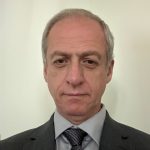Steenbock professorships awarded in physical sciences and mathematics
Mark Eriksson, professor of physics, and Mikhail Feldman, professor of mathematics, have been named recipients of UW–Madison Steenbock Professorships.
“This professorship is among the most prestigious and important professorships for researchers at the UW–Madison,” says Cynthia Czajkowski, interim vice chancellor for research. “This recognition is accompanied by discretionary funds to provide recipients the freedom to explore innovative research directions and new approaches to their research areas.”
In the early 1980s, Evelyn Steenbock initiated a program to endow a series of professorships in the natural sciences in honor of her late husband, Harry Steenbock, emeritus professor of biochemistry.
Harry Steenbock (1886-1967) developed an inexpensive method of enriching foods with Vitamin D. His discovery led to the eradication of rickets, the bone-deforming deficiency disease, throughout most of the world. He is also renowned for his discovery of the conversion of carotenes to vitamin A.
Steenbock assigned his patents for advances in human and animal nutrition to the Wisconsin Alumni Research Foundation (WARF), and accumulated royalties from Steenbock’s patents supplied about half the funds for the Steenbock Memorial Library construction on campus. Steenbock Memorial Library is a primary resource library for the students, faculty and research staff at the UW–Madison.
The Steenbock Professorship provides research funds to recipients annually for 10 years and honors those faculty who have made major contributions to the advancement of knowledge, primarily through their research endeavors at UW–Madison, but also as a result of their teaching and service activities.
Eriksson, awarded the Steenbock Professorship in the Physical Sciences, was recently chair of the Department of Physics. He joined the UW–Madison physics faculty in 1999 and is a world-leading expert in the development of quantum information systems using solid-state quantum dot qubits.
As department chair, Eriksson promoted the Wisconsin Idea by supporting the department’s role in connecting with audiences all around the state of Wisconsin, including restarting The Wonders of Physics Traveling Show.
Eriksson received a bachelor’s degree in physics and mathematics from UW–Madison in 1992 and his PhD from Harvard University. He was a postdoctoral member of technical staff at Bell Labs.
His research has focused on quantum computing, semiconductor quantum dots and nanoscience. He leads a team dedicated to developing spin qubits in gate-defined silicon quantum dots with the goal of enabling quantum computers, which manipulate information coherently, to be built using many of the materials and fabrication methods that are the foundation of modern, classical integrated circuits.
Eriksson is widely recognized for engaging collaborative partnerships with industry, government leaders and other university research institutions to tackle some of the greatest challenges in quantum information science and technology. Last year, the Eriksson group announced its partnership with Intel and HRL Laboratories as part of the LPS Qubit Collaboratory (LQC) national Quantum Information Science Research Center hosted at the Laboratory for Physical Sciences at the University of Maryland, College Park to collaborate on research in advanced computer technologies.
“I intend to use the award to explore new opportunities in silicon-based quantum computing, including new ideas for connecting qubits to each other across large distances, and the use of near-atomic-scale metamaterials to endow semiconductors with properties even better suited to quantum computing than those available today,” Eriksson says.
Feldman, who has earned the Steenbock Professorship in Mathematics, also joined the UW–Madison faculty in 1999. His research interest is in nonlinear partial differential equations (including elliptic and parabolic equations and free boundary problems, variational problems, and geometric and variational evolution problems).
Feldman is a world leading expert in partial differential equations and has made deep and original contributions to research on mass transport problems, free boundary problems, multidimensional transonic shocks and sandpile dynamics.
Feldman obtained major results in the study of elliptic-hyperbolic mixed type partial differential equations and helped solve major problems in fluid dynamics. His papers have appeared in prestigious journals in mathematics including the Annals of Mathematics, Inventiones and the Journal of the American Mathematical Society.
He has supervised multiple PhD students and postdocs at the University of Wisconsin and serves as the editor of two technical journals.
Before joining UW–Madison, Feldman spent two years as lecturer at the University of Pennsylvania, one year as a postdoctoral fellow at the University of California, Berkeley, and two years as an assistant professor of mathematics at Northwestern University. Feldman received his PhD from the University of California, Berkeley.
“I am honored and humbled to receive the Steenbock Professorship,” Feldman says. “Outside recognition of my research is truly important to me. I want to express my gratitude to UW–Madison, which has supported my research over the last 25 years. I also would like to thank my colleagues and collaborators for their insights and encouragement. This award creates new and exciting opportunities for my research and will allow me to explore new research directions.”
By Natasha Kassulke, natasha.kassulke@wisc.edu


